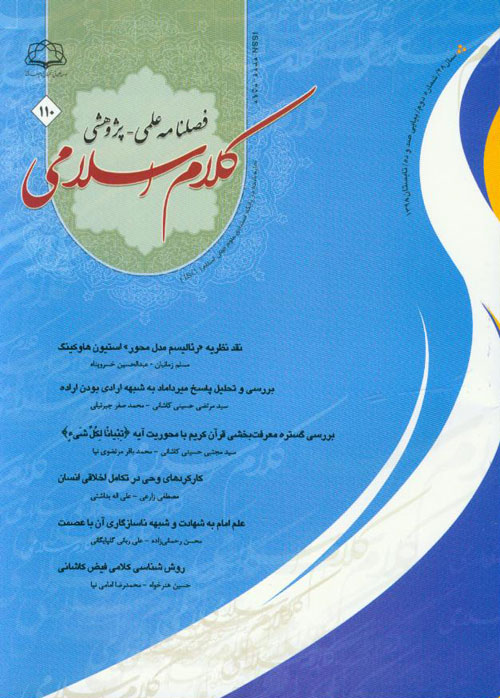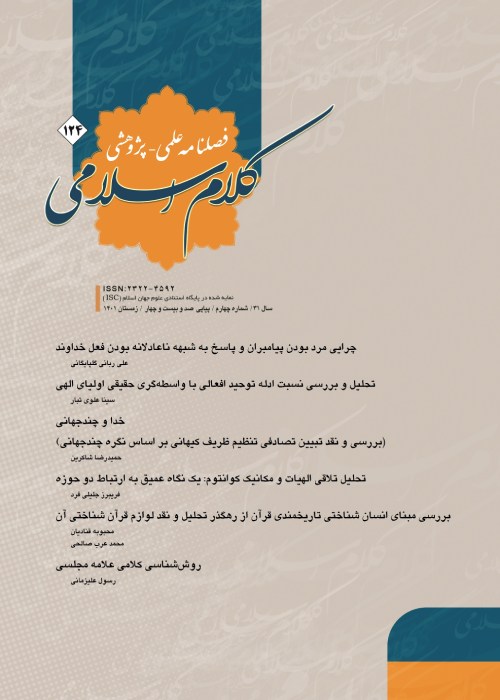فهرست مطالب

نشریه کلام اسلامی
پیاپی 110 (تابستان 1398)
- تاریخ انتشار: 1398/04/01
- تعداد عناوین: 7
-
-
صفحات 9-24یکی از مبانی بنیادین استیون هاوکینگ در حوزه ی معرفت شناسی نظریه ی «رئالیسم مدل محور» است. هاوکینگ با تاثر از اصل عدم قطعیت در فیزیک جدید و همچنین نگرش های ایده آلیستی حاکم بر آن به نوعی «رئالسیم» و «واقع گرایی» وابسته به مدل معتقد شده است که آن را وجه جمعی بین رئالیسم و ایده آلیسم می داند. طبق این مبنا هرگز شناخت جهان بدون مدل امکان پذیر نبوده، و هر کسی از دریچه ی یک مدل به جهان می نگرد. این مدل ها هیچ کدام به تنهایی تمام جهان را پوشش نداده، و هیچ کدام واقعی تر از دیگری نیستند. از آنجا که این مسئله زیربنای تفکرات خداناباورانه ی هاوکینگ را تشکیل می دهد نقد و ارزیابی آن ضروری است. تحقیق پیش رو ضمن توصیف این دیدگاه، و استخراج عوامل گرایش هاوکینگ به آن، دیدگاه فوق را به بوته نقد گذارده است. به نظر می رسد مبنای «رئالیسم مدل محور» در حقیقت همان «ایده آلیسم» است که با نقاب «رئالیسم» طرح شده، علاوه بر این که دچار دور بوده، و با سایر مبانی هاوکینگ نیز ناسازگار است.کلیدواژگان: استیون هاوکینگ، رئالیسم، رئالیسم مدل محور، مبانی معرفت شناختی
-
صفحات 25-52شبهه ارادی بودن اراده، یکی از قدیمی ترین شبهاتی است که در بحث جبر و اختیار مطرح شده است. این شبهه که متفاوت از شبهه «ضرورت علی» است، با تاکید بر محوریت اراده در تحقق افعال اختیاری انسان، چگونگی ارادی و اختیاری بودن ملاک فعل اختیاری را به چالش می کشد. از دیرباز پاسخ های متنوعی به این شبهه داده شده است. میرداماد از نخستین متفکرانی است که با اعتباری دانستن سلسله اراده ها به آن پاسخ داده است. متفکران پس از ایشان، پاسخ وی را مورد بررسی و نقد قرار داه و آن را نادرست دانسته اند. در نوشتار پیش رو، پس از تبیین شبهه، پاسخ میر داماد و نقدهای آن نقل و بررسی شده استکلیدواژگان: اراده، فعل اختیاری، تسلسل، اعتباری، ارادی بودن اراده، میرداماد
-
صفحات 53-75
اصلی ترین منبع معارف دینی در اسلام، قرآن کریم است، و یکی از مسائل مهم در باره قرآن، بحث از گستره معرفت بخشی، و تبیین زوایای پیدا و پنهان آن است؛ چه آنکه روشنی بخشی در این بحث گامی موثر در شبهه زدایی نسبت به این مائده آسمانی است. نوشتار پیش رو به بررسی گستره معرفت بخشی قرآن کریم با محوریت آیه 85 سوره نحل به عنوان یکی از مهم ترین آیات در این زمینه، پرداخته است. پژوهش حاضر، با استناد به مدلول روایات و قرائن موجود، نشان می دهد که منظور از این آیه، معرفت بخشی تام مجموعه ظاهر و باطن قرآن کریم است و تقیید آن به مسائل مربوط به هدایت در معنای خاص آن، ناصواب است
کلیدواژگان: آیه تبیانا لکل شیء، آیه 85 سوره نحل، معرفت بخشی حداکثری، معرفت بخشی حداقلی، گستره معرفت بخشی -
صفحات 77-95
این مقاله درصدد بیان کارکردهای وحی و نقش محتوای وحیانی دین در تکامل اخلاقی انسان است. این نقش گاهی در قالب معرفت شناسانه و گاهی در قالب روان شناسانه نمایان می شود، و گاهی نیز به صورت غیر مستقیم و در قالب معرفی الگوهای عملی و انسانهای تربیت یافته در سایه وحی در تکامل اخلاقی انسان موثر است. وحی یکی از منابع اصلی در معرفت دهی به انسان در زمینه ارزشهای اخلاقی و ضد ارزشها و شناساندن عوامل و زمینه های رشد اخلاقی و موانع سقوط اخلاقی است. تعالیم وحیانی همچنین زمینه بهره برداری بهتر از قوای انسان در راستای اخلاقی زیستن را برای انسانها فراهم می کند. پشتوانه عمل به فرامین اخلاقی از دیگر کارکردهای وحی است که در قالب ایمان و اعتقادات ایجاد میشود. یک نظام جامع اخلاقی بدون ارائه الگوی عملی، نظامی ناقص و کم اثر خواهد بود. وحی در این زمینه نیز به تکامل اخلاقی انسان کمک میکند.
کلیدواژگان: وحی، تکامل اخلاقی، کارکرد معرفت شناسانه، کارکرد روان شناسانه -
صفحات 97-114بحث درباره علم امام به زمان و چگونگی ارتحال یا شهادت خود، از فروع مسئله گستره علم امام است. این مسئله را می توان از منظر عقلی و نقلی بررسی کرد. از مجموع روایات عام و خاص درباره گستره علم امام به دست می آید که امامان اهل بیت: به زمان و چگونگی ارتحال یا شهادت خود آگاه بودند. در این جا این پرسش یا اشکال مطرح می شود که چرا آنان تن به شهادت داده و به حفظ جان خود که عقلا و شرعا واجب است، اقدام نکرده اند؟ آیا این مطلب با عصمت امام ناسازگار نیست؟ مقاله حاضر به بررسی این مسئله پرداخته و پس از نقل و بررسی روایات مربوط به علم امام به زمان ارتحال یا شهادت خود، پاسخ هایی را که عالمان شیعه به پرسش یا اشکال مزبور داده اند و برخی از آن ها در بعضی از روایات نیز بیان شده است، گزارش و تحقیق کرده است.کلیدواژگان: علم امام، شهادت امام، عصمت امام، تهلکه، القای خود به هلاکت
-
صفحات 115-139فیض کاشانی از متکلمان نامی شیعه در قرن یازدهم است و در زمینه اعتقادات دینی آثار گوناگونی دارد. روش کلامی او ترکیبی از نقل وحیانی، عقل فلسفی، و شهود عرفانی است. وی معتقد است که عقل نسبت به فهم برخی از معارف مستقل است و بین معارفی که حکمای نخستین بیان کرده اند و آنچه را که شرع بیان کرده، منافاتی وجود ندارد. آیات و روایات نقش ویژه ای در مباحث کلامی ایشان دارند تا آنجا که برخی از آثار کلامی او استنباط شده از آیات و روایات است. ایشان برخی از باورهای مربوط به معاد- مانند فرشته منکر، صحیفه اعمال، میزان و شهادت اعضای انسان- را به صورت حکمی و عقلی تبیین نموده است. وی فرقه صوفیه را سخت مورد نکوهش قرار داده، و مردم را نسبت به اعتقادات و رفتارهای ناشایست آنان برحذر کرده استکلیدواژگان: فیض کاشانی، روش شناسی، روش عقلی، روش عقلی- فلسفی، روش نقلی
-
صفحات 143-148
-
Pages 9-24One of the fundamental foundations of Steven Hawking's epistemology is model-based realism. Drawing on the uncertainty principle in modern physics as well as the idealistic attitudes that govern it, Hawking believes in a kind of "realism" and "realism dependent on the model", and sees it as a combination of realism and idealism. On this basis, it is never possible to know the world without a model, and everyone looks at the world through a model. These models alone do not cover the entire world, and none are more realistic than the other. Since this is the basis of Hawking's theistic thinking, it is necessary to critique and evaluate it. The present study, while describing this view and extracting factors of Hawking tendency to it, has criticized the above view. The basis of "model-based realism" seems to be in fact "idealism", designed with the mask of "realism", in addition to being round, and incompatible with other Hawking principlesKeywords: Steven Hawking, Realism, Model-Based Realism, epistemological foundations
-
Pages 25-52The question of the voluntary will is one of the oldest issues raised in the discussion of determinism. This question, which differs from the issue of "causal necessity", challenges the centrality of the will in the realization of human voluntary actions, challenging the voluntary and optional criterion of voluntary action. Various answers to this question have been discussed. One of the first to try to answer this question is Mirdamad. By validating the voluntary will and adapting it to other things, he has explained how the will is voluntary. In this article, after explaining this solution and reviewing its recent criticisms, it has been proven incomplete in problem solving.Keywords: : Mesbah Yazdi, pleasure, pain, Fitrat, practical monotheism
-
Pages 53-75
The main source of religious knowledge in Islam is the Holy Qur'an, and one of the important issues about the Qur'an is its epistemic scope, and the explanation of its Appearance and hidden angles. The present article examines the epistemological scope of the Holy Qur'an with the focus on verse 85 of al-Nahl chapter as one of the most important verses in this field. The present study, based on the existing traditions and evidences, shows that the meaning of this verse is that the Holy Quran has a complete knowledge and Limiting it to issues of guidance in its specific sense is wrong.
Keywords: Holy Quran, the verse Expressing everything, verse 85 of al-Nahl chapter, Maximum knowledge, minimum knowledge, epistemic scope -
Pages 77-95
This article seeks to express the functions of revelation and the role of the divine content of religion in human moral evolution. This role sometimes appears in the form of epistemology and sometimes in the form of psychology, and sometimes indirectly in the form of introducing practical patterns and trained human beings in the shadow of revelation, influencing human moral evolution. Revelation is one of the main sources of human knowledge in the field of moral values and anti-values and in identifying the factors and areas of moral development and the obstacles to moral decline. Revelation teaches us to make better use of human power to live ethically. Supporting the practice of moral commandments is another function of revelation that is created in the form of faith and belief. Without a practical paradigm, a comprehensive moral system would be incomplete and ineffective, and revelation would also contribute to human moral development.
Keywords: revelation, Ethical Evolution, Epistemological Function, Integumentary Function -
Pages 97-114The discussion, Imam's knowledge of his death, is one of the issues of the Imam's realm of knowledge. This issue can be investigated in both rational and transmissive ways. It comes from the general and specific narrations about the scope of the Imam's knowledge that the Imams of the Prophet (pbuh) were aware of their time and how they were died. This raises the question why they did not protect their lives which is rationally and legally obligatory. Is this not incompatible with the infallibility of the Imam? The present article examines this issue and, after quoting narrations related to the Imam's knowledge of the time of his death, presents the answers which Shiite scholars have provided, some of which have been quoted in some traditions.Keywords: Imam's knowledge, Imam's death, Imam's infallibility, Imamate, To destroy themselves
-
Pages 115-139Faiz Kashani is one of the 11th-century Shi'a theologians and has various works on religious beliefs. His theological method is a combination of revelation, philosophical reason, and mystical intuition. He argues that reason is independent of understanding some religious doctrines and that there is no contradiction between what the early scholars have stated and what the Shari'a has stated. Verses and narratives have a special role in their theological discourse as far as some of his theological works are inferred from the verses and narratives. He has explained some of the beliefs about resurrection such as the evil angel, the doctrine of the deeds, and the testimony of the human organs in a wise and rational manner. He strongly condemns the Sufi sect, and warns people of their bad beliefs and behaviorsKeywords: Faiz Kashani, methodology, Intellectual Method, Intellectual-Philosophical Method, Transactional Method


